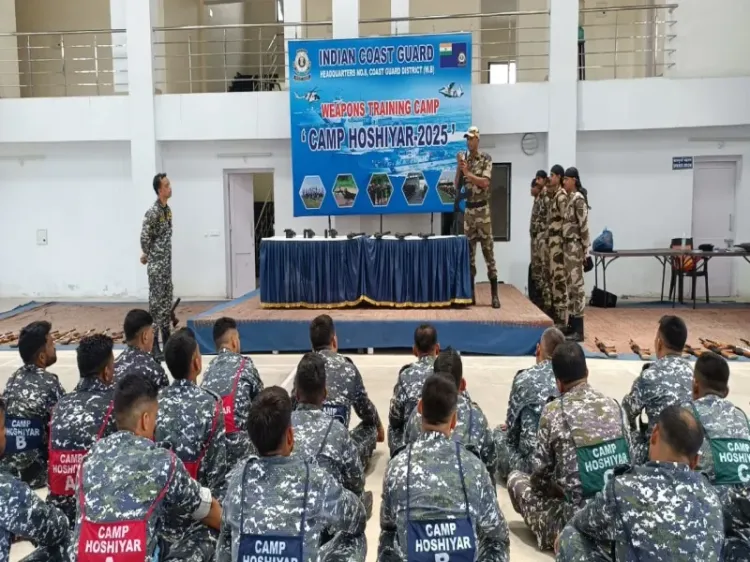Why Did ICG Organize Weapons Training Camp 'Hoshiyar-25'?

Synopsis
Key Takeaways
- ICG's role in maritime safety is vital.
- The 'Hoshiyar-25' camp enhances operational readiness.
- Collaboration with CISF strengthens security measures.
- Training prepares personnel for emerging threats.
- Maintaining deterrence against illegal activities is crucial.
Kolkata, May 30 (NationPress) The Indian Coast Guard (ICG) district headquarters in Haldia, West Bengal, conducted its annual weapons training camp 'Hoshiyar-25' from May 26 to May 30. ICG units from Kolkata, Haldia, and Frazerganj actively participated in this essential training event.
“Such camps hold significant importance. Even though ICG personnel are equipped with arms during operations and all vessels are armed, it is rare to achieve a 'firing solution.' The ICG's dual role encompasses saving lives at sea and thwarting smuggling, poaching, piracy, and infiltration attempts. Generally, the mere presence of an ICG vessel serves as a strong deterrent to wrongdoers, who either flee or surrender. Consequently, it is crucial to ensure that all personnel are adept in handling the various weapons at our disposal,” stated an official.
The camp included training in diverse weaponry and a refresher course on appropriate responses to various scenarios.
This year, the camp's significance was heightened due to escalating tensions between India and Pakistan following the terror attack in Pahalgam on April 22.
In retaliation, India initiated Operation Sindoor on May 7, inflicting considerable damage to terror infrastructure in Pakistan and Pakistan-occupied Kashmir. The ensuing four days saw a military confrontation between Indian and Pakistani armed forces, which concluded with an 'understanding' on May 10.
Terror groups operating from Pakistan, such as Lashkar-e-Taiba and Jaish-e-Mohammed, have issued threats to conduct attacks on India, adding to the exercise's importance. The 26/11 Mumbai terror attacks of 2008, which were executed by the Lashkar-e-Taiba via sea, remain a stark reminder.
“All trainees underwent comprehensive instruction on hostile boarding protocols, buddy operations, and weapons handling. For the first time, the Central Industrial Security Force (CISF) participated in the training, emphasizing tactical integration and shared safety practices. Live firing exercises at the Barrackpore range, a musketeer competition, and seamanship activities were core components of the camp. The aim was to enhance crew competency and steer the ICG in protecting the maritime environment and national interests within our Exclusive Economic Zone (EEZ),” the official explained.
The CISF oversees security at crucial installations in West Bengal, including the Syama Prasad Mookerjee Port facilities in Haldia and Kolkata, as well as the Garden Reach Shipbuilders and Engineers Ltd. Thus, this joint training was deemed vital.
The camp aimed at fostering teamwork, self-management, and command and control directives, ensuring the ICG remains poised, relevant, and responsive.









